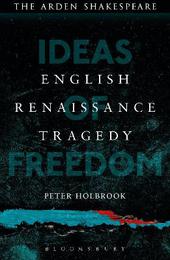
|
English Renaissance Tragedy: Ideas of Freedom
Hardback
Main Details
| Title |
English Renaissance Tragedy: Ideas of Freedom
|
| Authors and Contributors |
By (author) Dr Peter Holbrook
|
| Physical Properties |
| Format:Hardback | | Pages:256 | | Dimensions(mm): Height 198,Width 129 |
|
| Category/Genre | Literary studies - c 1500 to c 1800
Literary studies - plays and playwrights |
|---|
| ISBN/Barcode |
9781472572813
|
| Classifications | Dewey:822.05120903 |
|---|
| Audience | | Professional & Vocational | |
|---|
|
Publishing Details |
| Publisher |
Bloomsbury Publishing PLC
|
| Imprint |
The Arden Shakespeare
|
| Publication Date |
24 September 2015 |
| Publication Country |
United Kingdom
|
Description
This book's underlying claim is that English Renaissance tragedy addresses live issues in the experience of readers and spectators today: it is not a genre to be studied only for aesthetic or "heritage" reasons. The book considers the way in which tragedy in general, and English Renaissance tragedy in particular, addresses ideas of freedom, understood both from an individual and a sociopolitical perspective. Tragedy since the Greeks has addressed the constraints and necessities to which human life is subject (Fate, the gods, chance, the conflict between state and individual) as well as the human desire for autonomy and self-direction. In short, English Renaissance Tragedy: Ideas of Freedom shows how the tragic drama of Shakespeare's age addresses problems of freedom, slavery, and tyranny in ways that speak to us now.
Author Biography
Peter Holbrook is Professor of Shakespeare and English Renaissance Literature, University of Queensland, Australia and President of the International Shakespeare Association.
Reviews[Holbrook's] short readings of individual plays ... are fresh, provocative and frequently illuminating ... There is a great deal to engage readers of all sorts in ... this book and it is much to be welcomed. * Around the Globe * Relies on incisive close readings of individual characters to argue that the tragic genre served as a traditional vehicle for radical expressions of political subversiveness, religious heterodoxy, and cultural relativism. * Shakespeare Quarterly *
|